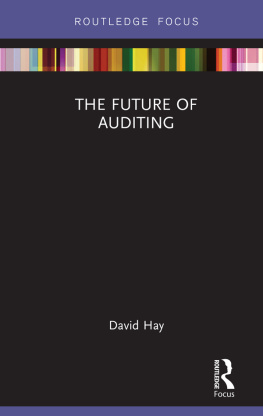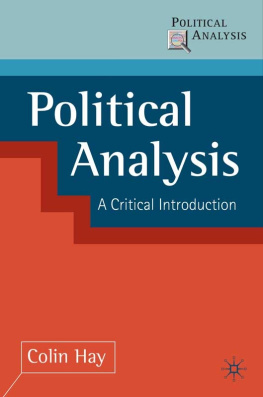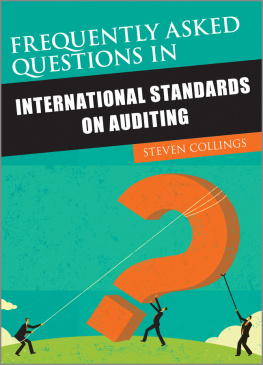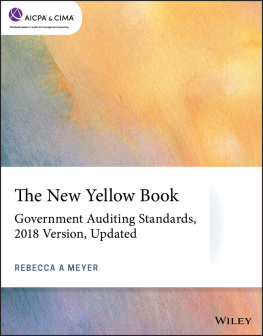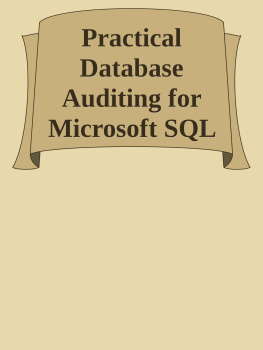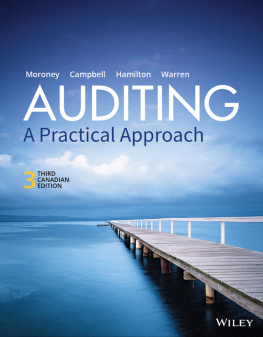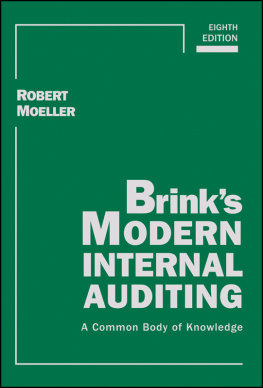Hay - The future of auditing
Here you can read online Hay - The future of auditing full text of the book (entire story) in english for free. Download pdf and epub, get meaning, cover and reviews about this ebook. year: 2020, publisher: Routledge, genre: Politics. Description of the work, (preface) as well as reviews are available. Best literature library LitArk.com created for fans of good reading and offers a wide selection of genres:
Romance novel
Science fiction
Adventure
Detective
Science
History
Home and family
Prose
Art
Politics
Computer
Non-fiction
Religion
Business
Children
Humor
Choose a favorite category and find really read worthwhile books. Enjoy immersion in the world of imagination, feel the emotions of the characters or learn something new for yourself, make an fascinating discovery.
The future of auditing: summary, description and annotation
We offer to read an annotation, description, summary or preface (depends on what the author of the book "The future of auditing" wrote himself). If you haven't found the necessary information about the book — write in the comments, we will try to find it.
Hay: author's other books
Who wrote The future of auditing? Find out the surname, the name of the author of the book and a list of all author's works by series.
The future of auditing — read online for free the complete book (whole text) full work
Below is the text of the book, divided by pages. System saving the place of the last page read, allows you to conveniently read the book "The future of auditing" online for free, without having to search again every time where you left off. Put a bookmark, and you can go to the page where you finished reading at any time.
Font size:
Interval:
Bookmark:
I appreciate the invaluable comments and advice provided by Robert Knechel and Marleen Willekens, and the excellent work by the authors of each chapter in The Routledge Companion to Auditing.
Overview
Financial statement auditing is important because financial reporting mis-statements are dangerous. They can lead investors to make bad decisions, cause lenders to take unnecessary risks, and reward managers when they do not deserve to be rewarded. Poor quality accounting and auditing can be bad for a whole countrys economy.
A general definition of auditing is that it is an assurance service which improves the quality of information or its context. In the context of financial statement auditing, which is the type of auditing that I mainly address in this book, financial reporting information is better more credible, more reliable because an auditor has examined evidence about the assertions making up the financial statements and convinced management to make changes that improve the accuracy and informativeness of financial statements. The assurance provided by an auditor allows financial statement users to better rely on the information. It has been vetted by an auditor whose conclusions are stated in the audit report.
Auditing has economic benefits, some of which are not always immediately obvious, for both the audited company and its management and the national (or global) economy as a whole. To understand auditing, it is necessary to be aware of those benefits.
The book examines the value of auditing, at present and in the future, from several perspectives. The perspectives include examining current understanding of why audits of financial statements are valuable; emerging issues that are important to the future of auditing; research opportunities about the understanding of the value of auditing; and research opportunities about the future of auditing.
and 28 of The Routledge Companion to Auditing , The function of auditing and The future of auditing research (Hay et al., 2014a; Hay et al., 2014b). The extended format allows me to further develop the discussion of the reasons for auditing and allows for greater links between the theory and suggestions for future research. The new book expands discussion of current issues.
The value of an audit, and the future of auditing research, are topics that are fundamental to auditing. This book is intended to be useful to decision makers who are not familiar with the research in this area, including legislators, policy makers, news media experts, standard setters, and research students. This book provides a single source that will gives a background to these fundamental issues and a source of further references to expand from.
Hay, D. C., W. R. Knechel, and M. Willekens. 2014a. Introduction: The Function of Auditing. In The Routledge Companion to Auditing , edited by D. C. Hay, W. R. Knechel, and M. Willekens, 110. Abingdon, Oxford: Routledge.
. 2014b. The Future of Auditing Research. In The Routledge Companion to Auditing , edited by D. C. Hay, W. R. Knechel, and M. Willekens, 351357. Abingdon, Oxon, UK: Routledge.
The value of auditing
Audits are valuable to a surprising range of parties, and some of the explanations for the valuation of auditing are counter-intuitive. We start with a simple explanation of the benefits of auditing provided by Willekens (2007), using the market for used cars as a parallel. Buying a used car is risky. Most car buyers are not experts, and cannot judge whether assertions made by the car salesman are reasonable and reliable. In the same way, shareholders and other stakeholders in a company are not able to find out whether assertions made by the directors are also reliable. In the case of the company, the assertions might be about how much profit the company has made or how liquid is its financial position. Assertions are made through the financial statements.
The used car buyer has the choice of not buying the car and taking the bus to work instead; or they could get an expert to investigate and give an opinion on the assertions made by the seller. To help the deal go through, the seller might even pay for a trustworthy expert to provide a report (e.g., a vehicle history report from CARFAX in the USA). In much the same way, potential investors have the option of not buying shares of a company if they are uncertain about the reliability of the accounts. Or they can rely on an auditor, as the expert on financial statement assertions, to give them a report on management-provided financial information. It might be in managements interests to engage a respected auditor if that helps investors to decide to commit their funds to the company.
The auditor does not give an opinion of the worth of the company or whether it is a wise investment. Rather, the audit report provides assurance that what management says is reliable.
The used car example is helpful up to a point, but auditing of financial statements takes place in a setting of much greater complexity. It is more complex than buying a used car because of the number of people involved and the ambiguity of financial information. If there are many shareholders and other stakeholders, it is not feasible to allow them all to examine the companys records in detail. There is also a wide range of parties involved in running the company directors, audit committee members, management all with their own self-interest, as well as their own views of what are the companys best interests. In addition, there is a well-known expectation gap, whereby different users have different ideas of what the auditor can do compared to what the auditor intends or is able to do. The amounts involved may be very large, and the underlying financial and accounting issues can be very complex. In many cases, there are operations and stakeholders in a variety of different international jurisdictions. And finally, auditing is usually controlled by regulation and professional standards.
There are a number of economic explanations for auditing, and these explanations overlap. They all provide reasonable explanations as to why managers might find it to be in their interests to submit to an audit, which they do implicitly when taking a job in a company that undergoes an audit. In addition, in many cases, auditing is required by law. The regulation of auditing can be explained by legislators looking after the interests of stakeholders who may not be able to influence the decisions of a company directly. It can also be explained in terms of the interests of the legislators. The next section discusses fundamental theories underlying the benefits of auditing.
Auditing can be seen as having an agency role; an information role; an insurance role; a management control role; a corporate governance role; and a confirmation role. These are the economic explanations for auditing. In all of these explanations, managers might voluntarily submit to being audited because it is in their own interests. In addition, in many settings auditing is compulsory but the economic explanations for why auditing is desirable still apply, and companies may engage an auditor to carry out something more than the absolute minimum level of audit effort required by auditing standards. The reasons why auditing is often compulsory are also important in understanding the function of auditing, and explanations for compulsory auditing are discussed later.
Shareholders are aware that managers may act in their own interest, and could report misleading information as a result. Agency relationships apply where one party (the principal) delegates authority, especially control over resources, to another (the agent) (Wallace, 1980, 1213). When agency relationships apply, there are agency costs. Agents might be self-interested and spend money for their own benefit, or might shirk their duties, or might be diligent but misguided. If nothing is done to avoid these possibilities, then the principal will be less inclined to enter into this relationship. The principal will spend less, or even avoid entering into the transactions altogether, reducing the scope of the agents activities or putting them out of work entirely. Investors might discount the information they receive, and pay a lower price for shares than the financial fundamentals would justify if the financial reports could be trusted (if they can be persuaded to invest at all). Agents have the incentive to prevent that from happening by arranging to reduce the costs of monitoring. The agent might appoint an auditor to report on the financial statements in order to give the principal more confidence and reduce monitoring costs. It becomes worthwhile from a managers point of view to provide auditing as a form of bonding of the manager, or monitoring on behalf of the shareholders. Agency costs include the costs that arise when otherwise useful activities are not undertaken because the risks are too high that the self-interested agent will take advantage of the situation, or when the principal expends effort in overseeing the agent.
Font size:
Interval:
Bookmark:
Similar books «The future of auditing»
Look at similar books to The future of auditing. We have selected literature similar in name and meaning in the hope of providing readers with more options to find new, interesting, not yet read works.
Discussion, reviews of the book The future of auditing and just readers' own opinions. Leave your comments, write what you think about the work, its meaning or the main characters. Specify what exactly you liked and what you didn't like, and why you think so.

